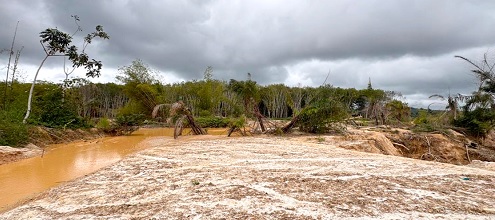Ghana’s natural rubber production has come under threat as illegal miners in the Western Region have made incursions into mature rubber plantations, destroying trees ready for tapping.
The trees currently under attack are investments running into millions of dollars by the rubber plantation and outgrowers from nursery to planting. Within a few hours, the illegal miners invade the farms and chop down the trees matured enough for tapping, to enable them to carry out their activities.
The situation is crippling the operations of the Ghana Rubber Estates Limited (GREL), and in some of the areas, more than 6,000 hectares of rubber plantation consisting of more than 2,000 trees have been destroyed.
The situation has also slashed the company’s yields in the affected areas, and the Western Regional Coordinating Council has described it as worrying and in need of immediate attention.
The natural rubber forms part of the country’s top 10 export commodities and the contribution of Ghana's rubber industry to the country's GDP is primarily seen through export revenues, which reached approximately $131.3 million in 2022 and $187 million in 2023.
Officials of GREL say the incursions by the illegal miners have led to declining production, trees being uprooted daily, and premature death of many of its trees due to chemicals used by the illegal miners, who also chop down its trees and use them to build camps for mining.
Dialogue
The Western Regional Security Liaison Officer, Brigadier General (Rtd) Musa Whajah, said, aside from the clampdown on the galamsey to mitigate the incursion, there is a need to engage host communities in dialogue to highlight the devastating impact of illegal mining on their operations.
He said GREL and its outgrowers extend a lot of social investments to the host communities; therefore, there is a need to ensure that the communities are engaged to be part of the fight against the degradation.
“We will fight the illegal activities and we know, in collaboration with the companies and all stakeholders, we will move to solve the challenges faster than expected,” he said.
He was speaking after a joint anti-galamsey operation last Thursday, which saw the deployment of personnel from the Second Infantry Battalion (2BN), police and national security.
Operation
The troops stormed two separate locations in Adiewoso and Tettrem in the Tarkwa Nsuaem Municipality of the Western Region, which saw the arrest of 12 suspects, including a female and 11 males.
The team retrieved two tricycles and a motorcycle and destroyed 25 chanfang machines, which were subsequently burned.
The 12 suspects, along with the seized exhibits, are currently in custody at the Agona Nkwanta District Police Command in the Ahanta West Municipality, helping with investigations.
“As a country, we cannot watch the devastation of cocoa farms, rubber plantations and threat to the arable lands, threat to national installations, health and water bodies, as well as forest reserves by the activities of these illegal miners,” Brigadier General (Rtd) Whajah said.
Negative impact
The rubber sector supports economic growth and job creation by processing technically specified rubber and exporting it.
The sector also provides the rubber outgrower plantations with projects, which play a crucial role in empowering smallholder farmers and promoting sustainable practices.
However, illegal mining is leading to the introduction of toxic chemicals like mercury and cyanide used to extract gold, and contaminating rivers, making them undrinkable and harmful to the food chain.

